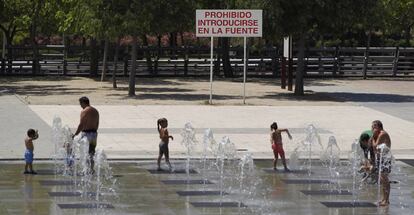Why hot weather can be deadliest at the beginning of the summer
A new study examining data from more than 300 cities shows that health risks fall as summer progresses

Numerous heat warnings have been activated in provinces across Spain, and meteorological predictions that this summer will be hotter and drier than usual are raising concerns about public health. A recently published study claims that the mortality risk for extreme heat is greater at the beginning of the summer than at the end – a fact that could encourage prevention campaigns to start earlier and focus on the first days of the summer.
“Results provide strong evidence of a reduction in risk over the season,” reported researchers from the London School of Hygiene and Tropical Medicine. In their study, they analyzed the adjustments and lifestyle modifications of 305 citizens from nine countries, including Spain.
Every country we studied showed a significantly higher mortality rate due to heat during the first weeks of summer
Researcher Aurelio Tobías
“Every country we studied showed a significantly higher mortality rate due to heat during the first weeks of summer,” said Aurelio Tobías, researcher with the Institute of Environmental Assessment and Water Research and one of the authors of the study. Published in the scientific newspaper American Journal of Epidemiology, its conclusions could be traced to factors such as the progressive adjustment to the heat, something that has been observed in many studies, combined with changes in behavior that help people adapt, such as changing routine or using fans or air conditioning.
The researchers believe that this notable decrease in heat-related deaths could be explained by the proliferation of heat-illness prevention campaigns and the investment of resources towards combating the heat. In the field of epidemiology, they use the term “harvesting effect” for the phenomenon where those whose health is already compromised are affected earlier rather than later. “This study shows consistently that the effect of the extreme heat of early summer lasts longer, from four to eight days, as opposed to at the end of the season, where it might only last two days,” adds Tobías.
Sign up to our newsletter
EL PAÍS English Edition has launched a weekly newsletter. Sign up today to receive a selection of our best stories in your inbox every Saturday morning. For full details about how to subscribe, click here.
While this study is among the first to analyze this harvesting effect at different points in the summer on an international scale, its results are not unprecedented. Other studies from across 15 European cities, 148 US cities and South Korea have ultimately arrived at similar conclusions.
This work could be useful for educational programs that offer information on how to stay cool and raise awareness of the effect of the heat on vulnerable groups, particularly the elderly. “It could be useful to launch these campaigns earlier, concentrating resources on the first few days of the summer, when the risk is highest,” suggested Tobías.
English version by Allison Light.
Tu suscripción se está usando en otro dispositivo
¿Quieres añadir otro usuario a tu suscripción?
Si continúas leyendo en este dispositivo, no se podrá leer en el otro.
FlechaTu suscripción se está usando en otro dispositivo y solo puedes acceder a EL PAÍS desde un dispositivo a la vez.
Si quieres compartir tu cuenta, cambia tu suscripción a la modalidad Premium, así podrás añadir otro usuario. Cada uno accederá con su propia cuenta de email, lo que os permitirá personalizar vuestra experiencia en EL PAÍS.
¿Tienes una suscripción de empresa? Accede aquí para contratar más cuentas.
En el caso de no saber quién está usando tu cuenta, te recomendamos cambiar tu contraseña aquí.
Si decides continuar compartiendo tu cuenta, este mensaje se mostrará en tu dispositivo y en el de la otra persona que está usando tu cuenta de forma indefinida, afectando a tu experiencia de lectura. Puedes consultar aquí los términos y condiciones de la suscripción digital.









































